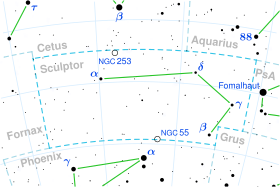Delta Sculptoris (δ Scl, δ Sculptoris) is a triple star system[9] in the constellation Sculptor. It is approximately 137.4 light years from Earth.[1]
| Observation data Epoch J2000 Equinox J2000 | |
|---|---|
| Constellation | Sculptor |
| Right ascension | 23h 48m 55.54658s[1] |
| Declination | −28° 07′ 48.9745″[1] |
| Apparent magnitude (V) | 4.57[2] |
| Characteristics | |
| Spectral type | A0Vp(Lam Boo)n[3] |
| U−B color index | -0.03[2] |
| B−V color index | +0.01[2] |
| Astrometry | |
| Radial velocity (Rv) | +8.70[4] km/s |
| Proper motion (μ) | RA: +100.80[1] mas/yr Dec.: -105.34[1] mas/yr |
| Parallax (π) | 23.73 ± 0.22 mas[1] |
| Distance | 137 ± 1 ly (42.1 ± 0.4 pc) |
| Absolute magnitude (MV) | 1.47[5] |
| Details | |
| Mass | 2.27[6] M☉ |
| Radius | 1.8[7] R☉ |
| Luminosity | 29[6] L☉ |
| Surface gravity (log g) | 4.34[8] cgs |
| Temperature | 9,750[6] K |
| Rotational velocity (v sin i) | 299[6] km/s |
| Other designations | |
| Database references | |
| SIMBAD | data |
The primary component, Delta Sculptoris A, is a white A-type main sequence dwarf[3] with an apparent magnitude of +4.59. It has a faint, 11.6 magnitude companion, Delta Sculptoris B, 4 arcseconds, or more than 175 astronomical units, away from it. Orbiting this pair at the much greater separation of 74 arcseconds, is the yellow G-type Delta Sculptoris C, which has an apparent magnitude of +9.4.[9][10]
This system is a candidate member of the AB Doradus moving group, an association of stars with similar ages that share a common heading through space.[11]
References
edit- ^ a b c d e f Van Leeuwen, F. (2007). "Validation of the new Hipparcos reduction". Astronomy and Astrophysics. 474 (2): 653–664. arXiv:0708.1752. Bibcode:2007A&A...474..653V. doi:10.1051/0004-6361:20078357. S2CID 18759600. Vizier catalog entry
- ^ a b c Ducati, J. R. (2002). "VizieR Online Data Catalog: Catalogue of Stellar Photometry in Johnson's 11-color system". CDS/ADC Collection of Electronic Catalogues. 2237. Bibcode:2002yCat.2237....0D.
- ^ a b Abt, Helmut A.; Morrell, Nidia I. (1995). "The Relation between Rotational Velocities and Spectral Peculiarities among A-Type Stars". Astrophysical Journal Supplement. 99: 135. Bibcode:1995ApJS...99..135A. doi:10.1086/192182.
- ^ Gontcharov, G. A. (2006). "Pulkovo Compilation of Radial Velocities for 35 495 Hipparcos stars in a common system". Astronomy Letters. 32 (11): 759–771. arXiv:1606.08053. Bibcode:2006AstL...32..759G. doi:10.1134/S1063773706110065. S2CID 119231169.
- ^ Anderson, E.; Francis, Ch. (2012). "XHIP: An extended hipparcos compilation". Astronomy Letters. 38 (5): 331. arXiv:1108.4971. Bibcode:2012AstL...38..331A. doi:10.1134/S1063773712050015. S2CID 119257644. Vizier catalog entry
- ^ a b c d Zorec, J.; Royer, F. (2012). "Rotational velocities of A-type stars". Astronomy & Astrophysics. 537: A120. arXiv:1201.2052. Bibcode:2012A&A...537A.120Z. doi:10.1051/0004-6361/201117691. S2CID 55586789. Vizier catalog entry
- ^ Allende Prieto, C.; Lambert, D. L. (1999). "Fundamental parameters of nearby stars from the comparison with evolutionary calculations: Masses, radii and effective temperatures". Astronomy and Astrophysics. 352: 555–562. arXiv:astro-ph/9911002. Bibcode:1999A&A...352..555A. Vizier catalog entry
- ^ David, Trevor J.; Hillenbrand, Lynne A. (2015). "The Ages of Early-Type Stars: Strömgren Photometric Methods Calibrated, Validated, Tested, and Applied to Hosts and Prospective Hosts of Directly Imaged Exoplanets". The Astrophysical Journal. 804 (2): 146. arXiv:1501.03154. Bibcode:2015ApJ...804..146D. doi:10.1088/0004-637X/804/2/146. S2CID 33401607. Vizier catalog entry
- ^ a b Eggleton, P. P.; Tokovinin, A. A. (2008). "A catalogue of multiplicity among bright stellar systems". Monthly Notices of the Royal Astronomical Society. 389 (2): 869. arXiv:0806.2878. Bibcode:2008MNRAS.389..869E. doi:10.1111/j.1365-2966.2008.13596.x. S2CID 14878976. Vizier catalog entry
- ^ Mason, Brian D.; Wycoff, Gary L.; Hartkopf, William I.; Douglass, Geoffrey G.; Worley, Charles E. (2001). "The 2001 US Naval Observatory Double Star CD-ROM. I. The Washington Double Star Catalog". The Astronomical Journal. 122 (6): 3466. Bibcode:2001AJ....122.3466M. doi:10.1086/323920. Vizier catalog entry
- ^ McCarthy, Kyle; White, Russel J. (June 2012), "The Sizes of the Nearest Young Stars", The Astronomical Journal, 143 (6): 14, arXiv:1201.6600, Bibcode:2012AJ....143..134M, doi:10.1088/0004-6256/143/6/134, S2CID 118538522, 134.
